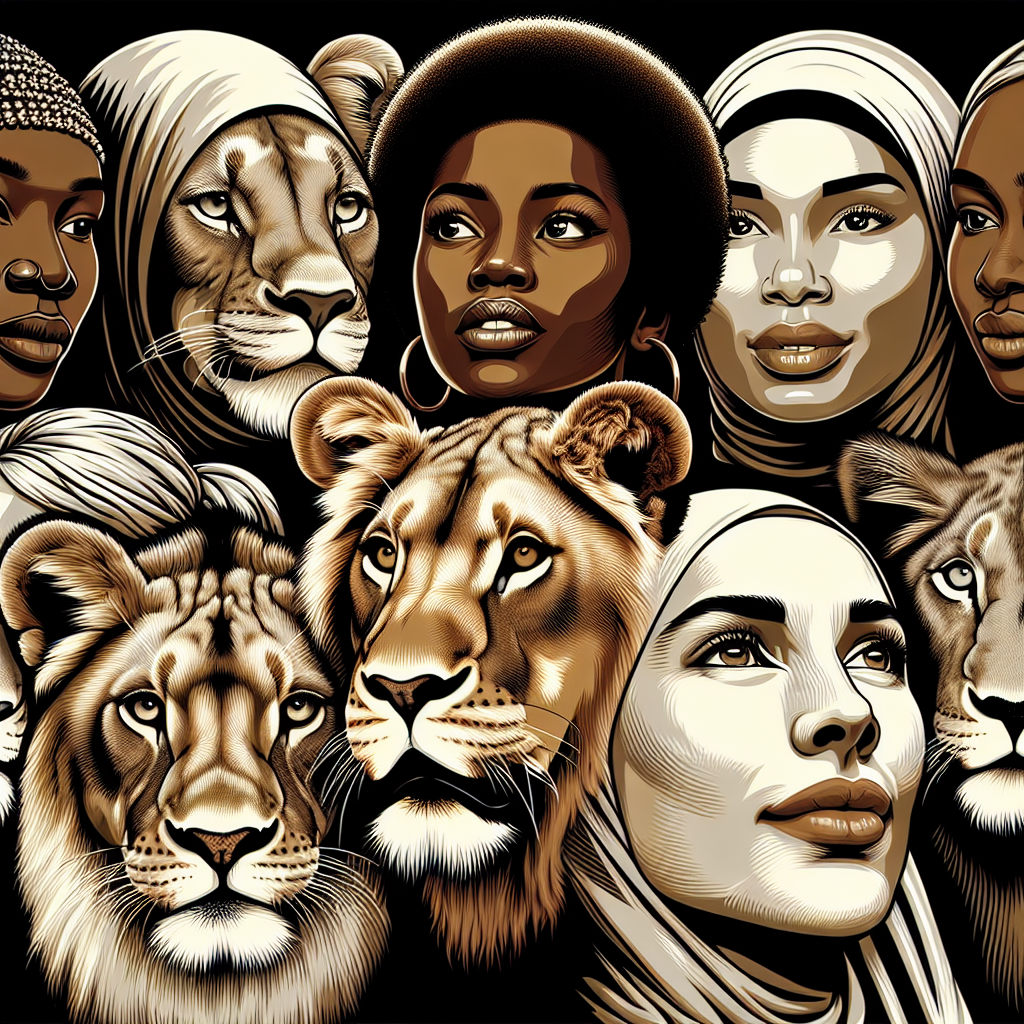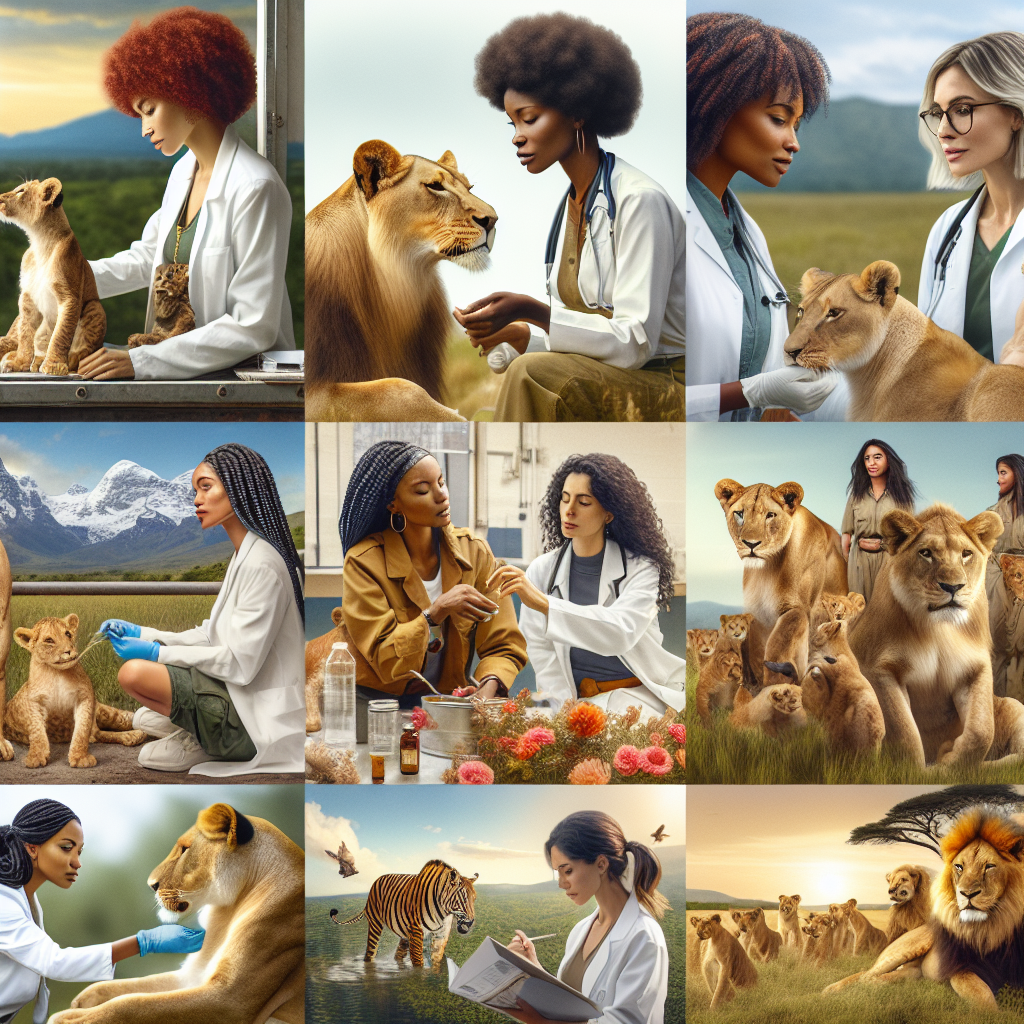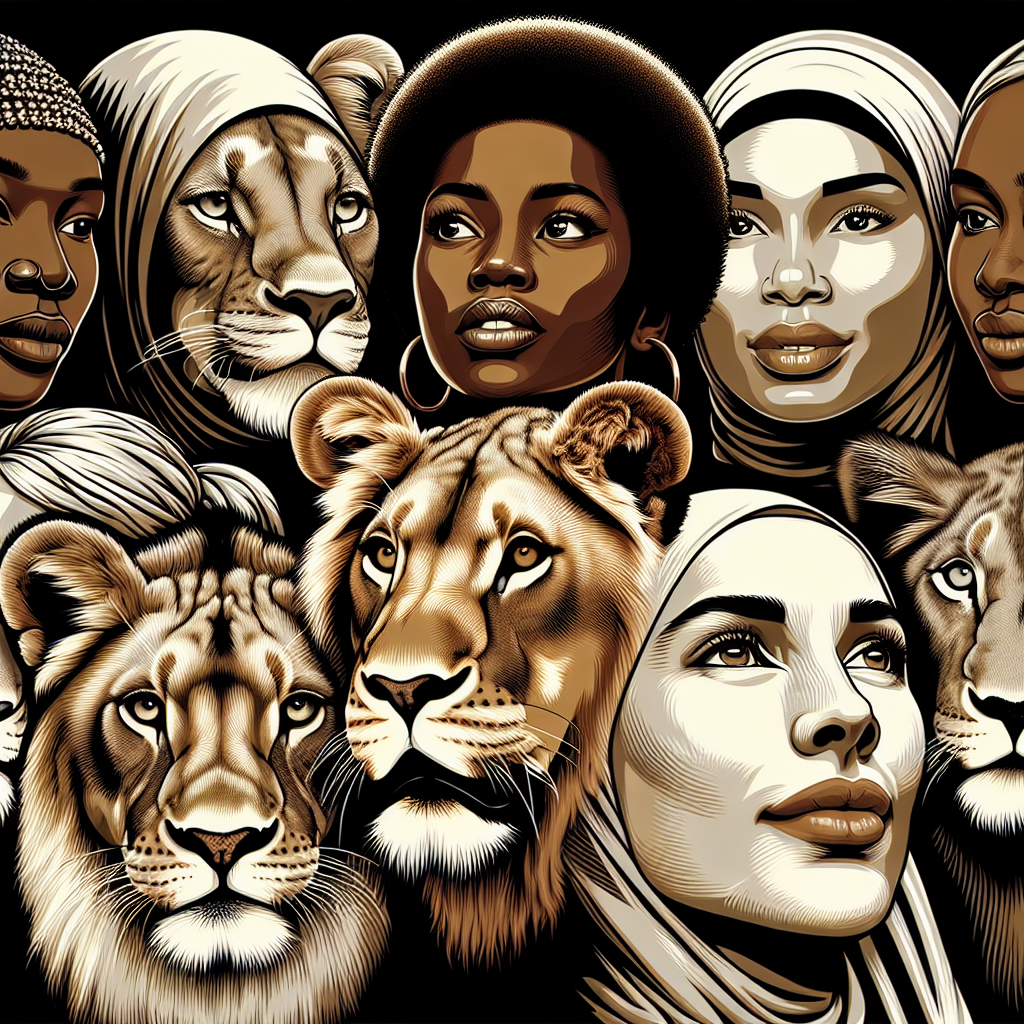You may not realize it, but there are remarkable women all around the world who are tirelessly working towards the conservation of lions, often without receiving the recognition they deserve. These women, whether they are researchers, activists, or community leaders, play a crucial role in local engagement efforts, advocating for the continued protection of these majestic creatures. In this article, we shine a spotlight on the unsung heroes of lion conservation, highlighting their invaluable contributions and shedding light on the challenges they face in their quest to ensure a future for lions and their habitats.
The Importance of Women in Lion Conservation
Lions are magnificent and majestic creatures that are an integral part of our planet’s biodiversity. However, they face numerous threats, such as habitat loss, poaching, and conflict with humans. In order to protect and conserve these iconic animals, it is crucial to engage and empower women in lion conservation efforts.
The role of women in conservation efforts
Women play a vital role in lion conservation efforts. They bring unique perspectives and skills to the table, contributing to the success of conservation initiatives. Traditionally, women have had a deep connection with their environment and possess a wealth of knowledge about local ecosystems and biodiversity. Their understanding of the land, plants, and wildlife can greatly enhance our understanding of lions and their habitat.
Women’s unique skills and perspectives
Women’s unique skills and perspectives are invaluable in lion conservation. Their attention to detail, patience, and ability to build strong relationships with communities can greatly contribute to conservation success. Women often excel at creating and maintaining connections with local communities, gaining their trust, and promoting sustainable practices. Additionally, their nurturing nature and empathy can help foster a sense of compassion and respect for wildlife among local populations.
The impact of women’s involvement on conservation success
The involvement of women in lion conservation has a significant impact on the success of conservation efforts. Research has shown that when women are actively engaged in conservation actions, there is a higher likelihood of positive outcomes. Their participation leads to increased community support and better cooperation between stakeholders. Moreover, women’s involvement also enhances the sustainability of conservation initiatives, as they tend to prioritize long-term environmental stewardship.
Empowering Women in Conservation
In order to fully harness the potential of women in lion conservation, it is essential to empower them and promote gender equality within conservation organizations.
Promoting gender equality in conservation organizations
Conservation organizations need to take proactive steps to promote gender equality within their teams. This can involve creating inclusive policies, ensuring equal opportunities for career advancement, and addressing any existing biases or discrimination. By fostering a culture of gender equality, organizations can create an environment where women feel valued, respected, and empowered to make meaningful contributions to lion conservation.
Providing training and education opportunities for women
Providing training and education opportunities specifically tailored for women in lion conservation is crucial. This can include targeted capacity-building programs that equip women with the necessary skills and knowledge to become effective conservation practitioners. By investing in the education and professional development of women, we can unlock their full potential and ensure their active participation in lion conservation.
Creating support networks for women in conservation
Establishing support networks for women in conservation can be instrumental in empowering them and fostering a sense of community. These networks can provide mentorship, guidance, and a platform for women to share experiences and learn from one another. By creating a supportive ecosystem, women in lion conservation can feel encouraged, inspired, and better equipped to overcome challenges and contribute to the conservation cause.

Women-led Community Initiatives
Empowering women to lead community initiatives is a powerful approach to lion conservation. When women take the lead in conservation projects, they bring unique insights and approaches that can better resonate with local communities.
Establishing women-led community conservation projects
Encouraging women to establish and lead community-based conservation projects can yield significant benefits. Women are often deeply connected to their communities and possess a thorough understanding of their cultural and social dynamics. By involving women in the decision-making process and supporting their initiatives, we can ensure that conservation efforts are culturally sensitive, inclusive, and community-driven.
Engaging local women as conservation ambassadors
Local women can be powerful conservation ambassadors within their communities. When women are involved in raising awareness about the importance of lion conservation and the need for sustainable practices, they can effectively communicate and resonate with their peers. By harnessing their influence, we can inspire positive change and drive greater community involvement in lion conservation efforts.
Empowering women to lead community awareness campaigns
When women are empowered to lead community awareness campaigns, the impact can be profound. They can utilize their unique communication skills and cultural understanding to engage with communities in a meaningful way. By organizing workshops, educational events, and outreach programs, women can create a platform for dialogue, knowledge-sharing, and collective action, ultimately fostering a culture of conservation within their communities.
Women’s Contributions to Research and Fieldwork
Women have made significant contributions to scientific research and fieldwork related to lions. Their expertise and dedication have contributed to a deeper understanding of lion behavior, ecology, and conservation needs.
Women scientists and their pioneering research on lions
Women scientists have been at the forefront of pioneering research on lions. Their groundbreaking studies have shed light on various aspects of lion biology, including social structures, mating behavior, and habitat requirements. By conducting comprehensive research, these women have played a critical role in shaping conservation strategies and management plans.
Women’s crucial role in field surveys and data collection
Fieldwork is essential for gathering accurate data on lion populations and their habitats. Women have played a vital role in field surveys and data collection, often working in challenging and remote environments. Their diligence, attention to detail, and ability to build relationships with local communities have helped ensure the collection of high-quality data, which is crucial for informed conservation decision-making.
Promoting women’s participation in wildlife monitoring programs
Promoting women’s participation in wildlife monitoring programs can greatly enhance conservation efforts. By actively involving women in the monitoring and tracking of lion populations, we can improve data collection, enhance community engagement, and contribute to the long-term conservation of these magnificent creatures. Increased female representation in wildlife monitoring programs also helps break down gender stereotypes and promotes more equitable participation in conservation initiatives.

Challenges Faced by Women in Lion Conservation
Despite their significant contributions, women in lion conservation face several challenges that hinder their full participation and impact.
Gender-based discrimination and inequality
Gender-based discrimination and inequality persist in many parts of the world, making it challenging for women to fully engage in lion conservation. Women often face barriers such as limited access to resources, unequal pay, and lack of representation in decision-making processes. Addressing these issues and promoting gender equality within conservation organizations and communities is essential to overcome these challenges.
Limited access to resources and funding
Women in lion conservation often face limited access to resources and funding, which can hinder their ability to implement effective conservation initiatives. Limited financial resources and access to training opportunities can prevent women from fully realizing their potential. It is crucial to invest in programs that provide equal opportunities for women and ensure they have the necessary resources to carry out their vital work.
Balancing family responsibilities with conservation work
Many women in lion conservation struggle to balance their family responsibilities with their conservation work. The demanding nature of fieldwork and the long hours required can make it challenging for women with caregiving responsibilities. Providing support systems such as flexible work arrangements, childcare facilities, and family-friendly policies can help address this issue and enable women to continue their vital conservation work.
Transforming Perspectives: Changing the Narrative
It is essential to transform societal perspectives and challenge existing narratives in order to empower women in lion conservation fully.
Highlighting the achievements of women in lion conservation
Highlighting the achievements of women in lion conservation is crucial to shift societal perspectives. By celebrating the accomplishments and contributions of women, we can challenge gender stereotypes and inspire others to pursue careers and leadership roles in conservation. Recognizing and publicizing the success stories will create role models for future generations, encouraging more women to actively engage in lion conservation.
Promoting positive role models for future generations
Promoting positive role models is essential in inspiring the next generation of women conservationists. By showcasing the accomplishments and contributions of women in lion conservation, we can ignite a sense of passion and purpose among young girls. Encouraging female mentorship and offering internship opportunities can provide invaluable experiences and guidance, setting the stage for future women leaders in lion conservation.
Overcoming stereotypes and biases within the conservation field
Overcoming stereotypes and biases within the conservation field is crucial to fostering an inclusive and diverse environment. By challenging preconceived notions and biases, we can create a space that welcomes women and promotes their active participation in lion conservation. This requires addressing systemic barriers, promoting inclusive language and practices, and providing equal opportunities for women to lead and make decisions.
Collaborative Approaches: Women and Male Allies
Collaboration between women and male allies is essential for promoting gender equality in lion conservation.
The importance of men supporting women in lion conservation
Men have a crucial role to play in supporting and promoting the inclusion of women in lion conservation. By actively advocating for gender equality, men can help break down barriers and challenge discrimination. Men can use their privileged positions to amplify the voices of women, create space for their ideas and contributions, and work towards fostering a more inclusive and equitable conservation sector.
Promoting inclusivity and gender diversity in conservation teams
Promoting inclusivity and gender diversity within conservation teams is essential to harness the full potential of all team members. By fostering an environment that values and respects diversity, organizations can benefit from a wide range of perspectives, experiences, and skills. This collaborative approach can enhance creativity, innovation, and the overall effectiveness of conservation efforts.
Collaborating with local communities to address gender issues
Collaborating with local communities is crucial to address gender issues in lion conservation. By engaging community members, particularly women, in decision-making processes and conservation initiatives, we can ensure that their needs and perspectives are taken into account. This collaborative approach is vital for building trust, fostering ownership, and creating sustainable solutions that address the unique challenges faced by women in lion conservation.
Educating and Inspiring the Next Generation
Educating and inspiring the next generation is essential for the long-term success of lion conservation efforts.
Integrating conservation education in schools and communities
Integrating conservation education in schools and communities is crucial to instill a sense of environmental stewardship from an early age. By incorporating wildlife and environmental curriculum, we can raise awareness about the importance of lion conservation and inspire young minds. Engaging students in hands-on activities, field trips, and experiential learning can create a lasting impact and nurture a passion for conservation in young girls.
Engaging girls in wildlife and environmental programs
Engaging girls in wildlife and environmental programs is essential to bridge the gender gap in the field. By providing equal opportunities and encouraging girls to participate in wildlife clubs, nature camps, and citizen science projects, we can empower them to develop a deeper connection with nature and aspire to pursue careers in lion conservation. Early engagement and exposure can help break down gender stereotypes and create a pipeline of future female conservationists.
Fostering a passion for conservation in young girls
Fostering a passion for conservation in young girls is key to ensuring their long-term engagement in lion conservation. By providing mentorship, role models, and opportunities for hands-on experiences, we can ignite a sense of purpose and commitment. Encouraging young girls to explore various aspects of conservation, from research to community engagement, can help them find their niche and pave the way for a sustainable future in lion conservation.
Success Stories: Celebrating Women’s Achievements
Celebrating the achievements of women in lion conservation is vital to inspire and motivate others.
Profiles of influential women in lion conservation
Profiles of influential women in lion conservation can highlight their accomplishments and provide inspiration. By sharing their stories, we can showcase the diverse career paths, contributions, and successes of women in the field. These profiles can serve as role models for aspiring conservationists and demonstrate that women can make a significant impact in lion conservation.
Recognizing their contributions to the field
Recognizing and honoring the contributions of women in lion conservation is crucial for acknowledging their hard work and dedication. Awards, grants, and fellowships specifically designed for women can help showcase their achievements and provide them with the recognition they deserve. By celebrating women’s contributions, we can inspire others, foster a supportive community, and ultimately drive positive change in lion conservation.
Sharing success stories to inspire others
Sharing success stories of women in lion conservation is a powerful way to inspire and motivate others. Through various communication channels, such as social media, publications, and conferences, we can amplify these stories and reach a wider audience. By showcasing the impact and accomplishments of women, we can create a ripple effect, encouraging more women to pursue careers and leadership roles in lion conservation.
Building a Sustainable Future: Women in Long-Term Engagement
Ensuring the long-term engagement of women in lion conservation requires creating opportunities for leadership, career growth, and mentorship.
Encouraging women’s leadership in conservation organizations
Encouraging women’s leadership in conservation organizations is essential for building a sustainable future. By breaking down barriers to leadership positions and providing mentorship, organizations can cultivate a new generation of women leaders in lion conservation. Creating a supportive environment that encourages women to take on leadership roles will result in more equitable decision-making processes and more effective conservation outcomes.
Creating opportunities for career growth and mentorship
Creating opportunities for career growth and mentorship is crucial to retain women in lion conservation. By providing mentorship programs, networking opportunities, and access to professional development resources, organizations can support women in their career paths. This will enhance their skills, build confidence, and help them overcome challenges that they may face in their journey.
Ensuring the continuation of women’s involvement in lion conservation
To ensure the continuation of women’s involvement in lion conservation, it is vital to address the structural and systemic barriers they face. Taking steps to promote equal opportunities, fair compensation, and work-life balance will contribute to an environment where women can thrive. By investing in programs that support the ongoing engagement of women and recognizing their important contributions, we can secure a sustainable future for lion conservation.
In conclusion, the importance of women in lion conservation cannot be overstated. Their unique skills, perspectives, and contributions have a significant impact on the success of conservation efforts. By empowering women, promoting gender equality, and creating supportive networks, we can harness their potential and ensure a more equitable and sustainable future for lion conservation. It is through collaborative approaches, education, and celebrating their achievements that we can inspire the next generation of women leaders in this crucial field. Together, we can protect and preserve these magnificent creatures for generations to come.

